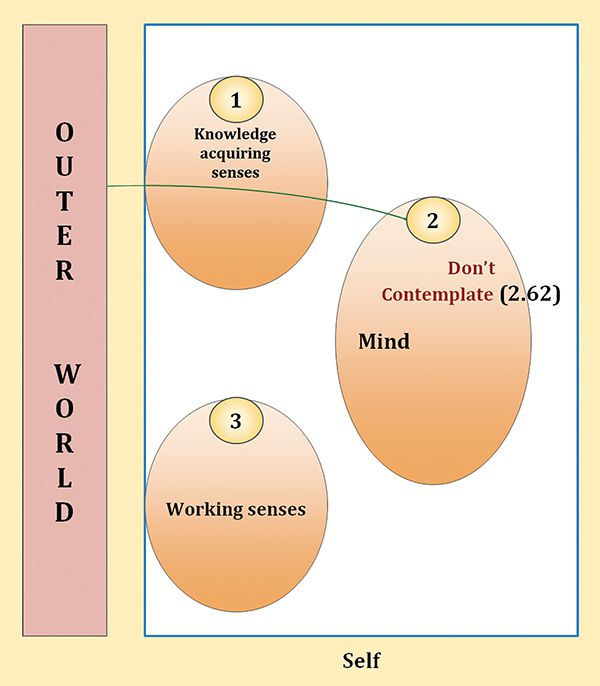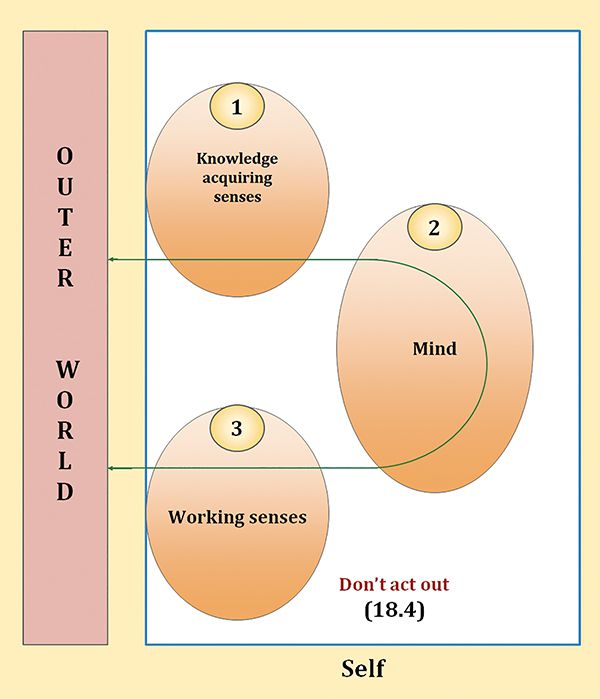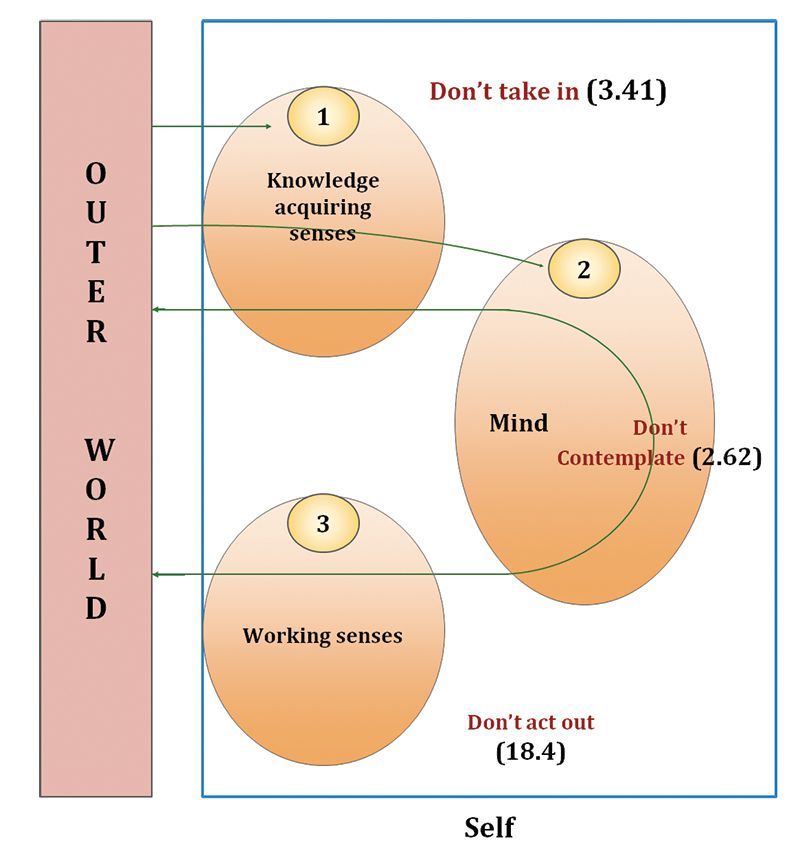Reflections on
“Animal” Movie
The Bhagavad-gita Perspective
Animal” movie has raised a lot of controversy, with people supporting it and opposing it. So I’m going to reflect on it from a Bhagavad-gita perspective, not so much on the movie as on the issue raised by the movie. Let me make it clear: I have not watched the movie; I have no intention of watching it, nor do I recommend anyone to watch it. It has an ‘A’ rating. But as a teacher of the Bhagavad-gita, I would like to show how the Bhagavad-gita can offer us insights on issues of contemporary concern. The Bhagavad-gita is not just a religious book or a spiritual book; it is also a book that offers us wisdom to look at current issues with deeper insight.
Protection at an individual level
The movie has a lot of gory violence and, along with a few other things, has triggered the controversy of whether such movies should be produced and promoted. Does it mean that a popular movie is automatically good for the society in general? Whenever movies and movie producers are questioned for their content, we hear familiar protests: “Oh c’mon, movies are just for entertainment, they just change people’s hairstyle, not their lifestyle. Violence in reel-life has no connection with violence in real life.”
So, what is the reality?
The Bhagavad-gita explains that inputs to our system come from outside of us to inside of us through our five senses (eyes, ears, etc.), Within our body, we have two distinct faculties — the mind and the intelligence.
The mind goes by feelings: “If it feels good, it must be good.” The mind does not have the power to discriminate of what is good from bad. Indiscriminately, it will consume all kinds of entertainment, irrespective of what values are depicted in it.
The intelligence, on the other hand, can discern what is beneficial, what is harmful, what is real, what is reel, what is just unreal, what is fictional, what is to be accepted, what is to be rejected. The entertainment industry is aware of this principle to some extent, which is why movies depicting sexuality or violence are given an ‘A’ rating. The point is that children have an active mind but not a well-developed intelligence that can discern between affection and reality. That’s why many countries have laws banning ads that are targeted specifically toward children.
Movies and other entertainment primarily cater to the mind. The Bhagavad-gita advises us that this entertainment, known as vihara, is an essential need for everyone. But it must be yukta, “regulated.” That’s where we need a well-developed intelligence to differentiate between the fictional and the real. The intelligence should help us filter out whatever is harmful or dangerous for our existence.
The filter can act at three levels. First, we disallow certain inputs to enter because we know in advance that they’re harmful. Second, certain harmful inputs may enter into our system, but we don’t replay it in our minds by repeated contemplation (smaranam). And third, harmful inputs have entered our system and we are unable to avoid thinking about them, but we use our intelligence and stop ourselves from acting on it. For example, we may have some dark fantasies of certain type of enjoyment which we may watched on television, but we know it is a crime to act in such a way. Thus although our minds fantasize on such enjoyment, we use our intelligence to not indulge in it in real life. To summarize, the three types of intelligence filter are: Don’t take in, don’t replay, don’t act out.
For most people with reasonably developed intelligence, even if they take in something as entertainment, they don’t act it out, even if they replay it. That’s why there may be movie scenes with violence where one person is beating up a hundred people, and most people in real life know that’s not realistic and they won’t act it out.
So where does the problem lie? Although most people are intelligent enough to not act out on their perverted fantasies, there a dangerous few who can fall victims to such harmful inputs — where the intelligence filter fails to function. Not everybody’s intelligence is equally developed, so there are people who take in harmful inputs into their system, keep on playing them in their minds, and, as soon as they get an opportunity, act on them. Even those people who are not prone to commit violence can end up committing horrible acts when they are in vulnerable situations. For examples, imagine someone who have had violent imagery going on in their mind. If such a person finds himself in a position of extraordinary power over someone else, what is being replayed can start playing out — he will misuse his power to commit violence on his dependent or subordinate. The intelligence filter was not strong enough to stop him from acting wrongly.
Just as we saw the three types of intelligence-filter, we may find three types of people based on how they respond to harmful inputs that have entered into their system:

- People who take in harmful inputs, but they don’t intend or plan to act on them. But they may find themselves in a situation where they are tempted to act in an immoral or harmful way.
- People who are wicked in nature, looking for opportunities and hunting for prey. The fire of lust and violence is already burning in them, but such movies turn the fire into an inferno. When such people get an opportunity to exploit others, they commit extreme forms of violence.

The best intelligence at an individual level is where we don’t take in inputs that are even having a slight possibility of being destructive in the long run — of tempting us or pushing us to act out in a destructive way. That is what the Bhagavad-gita states, Krishna warns us about taking any such inputs into our system:
“Therefore, O Arjuna, best of the Bharatas, in the very beginning curb this great symbol of sin [lust] by regulating the senses and slay this destroyer of knowledge and self-realization.”

We have no control over what movies the industry is going to churn out, but we can protect our consciousness by nourishing our intelligence. The study of the Bhagavad-gita can strengthen our intelligence by which we can have the appropriate filters at the appropriate levels.
The Bhagavad-gita says contemplation (dhyayato), replaying the images in our mind, is the beginning of the problem. That’s what takes us down on a slippery inner slope. If we are unable to stop at this point, Lord Krishna says, sama (“control of the mind”) and dama (“control of the senses”). This sama means just keep the mind peaceful; don’t let negative stimuli come in. Even if the mind does get agitated sometimes, practice dama, which means don’t act it out. We have to extremely watchful so that the negative propaganda coming from outside doesn’t overwhelm us.
Protection at a social level
Having discussed how to protect ourselves on an individual level, what responsibility are the leaders of society is supposed to take?
Society must be administered in such a way so that it doesn’t promote garbage in terms of ideas and values that incite violence and sexuality. The leaders should take proper responsibility to filter out various factors that are beyond individuals’ control.
The nature of the world, especially in this age, is that the overall consciousness of the people will deteriorate. Leaders of society should facilitate every individual to strengthen their intelligence so that they can protect themselves from external attacks. And the Bhagavad-gita is a prime book that can strengthen the individual intelligence of people one at a time. By studying the Bhagavad-gita, by distributing this knowledge, by sharing its wisdom with others, by speaking on it, by encouraging others to read it, we all can provide individuals the inner defense by which even if toxic forms of entertainment and media are manifest in the world people have the inner boundaries, the inner resources for defending themselves.
One last point is that it would be best if we have entertainment that is both entertaining and uplifting. They should give good moral values. We had the Ramayana that was running on television for several years, which was replayed during the pandemic. That’s a good example of something that is as entertaining and uplifting. Rather than relying on entertainment that is questionable if not degrading, it is best if more people take the responsibility to create content that is both entertaining and uplifting. The more we do this, the more we will have both the mind and the intelligence being nourished through the content that people are taking in general. We can thus create a new world order that consist of individuals who are emotionally, intellectually and spiritually healthy.
Chaitanya Carana Dasa is the associate-editor of Back to Godhead (US and Indian editions). To read his daily Bhagavad-gita reflections, please subscribe to Gitadaily on his website, thespiritualscientist.com.


